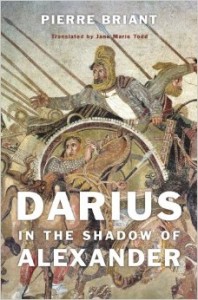 Darius in the Shadow of Alexander
Darius in the Shadow of Alexander
by Pierre Briant. Translated by Jane Marie Todd
Harvard University Press. 579 pages, $39.95
HISTORY is written by the winners, but in recent years there’s been a trend toward considering history from the viewpoint of those who found themselves on its losing side. Such an approach is announced in the very title of Darius in the Shadow of Alexander, a 2003 work newly translated into English. Here, Pierre Briant, emeritus professor of ancient history at the Collège de France in Paris, seeks “to explain why Darius, along with so many others, is condemned to haunt the realm of historical oblivion.” The result is a fascinating meditation on the nature of power and the role of words and images in shaping and maintaining it.
Introducing the book and elaborating on its title, Briant acknowledges that his subject is not only Darius III, the last of the Achaemenid rulers of Persia, but also Alexander the Great, the bisexual Greco-Macedonian king whose conquest of the Persian Empire in 331 BCE at the age of 25 ushered in an age of Hellenistic influence and a geopolitical sea change that reverberates to this day. The fact that we call Jesus “Christ,” a Greek word, is a result of the export of Hellenism to regions conquered by Alexander, whose empire stretched from the Balkans to northern India. Before Alexander, civilization had generally flowed from east to west; Alexander reversed its dominant direction for the next few centuries.
Alexander had been trained by Aristotle to think on his feet and to have a “Plan B.” From his father, the crafty Philip II of Macedon, he inherited a superb fighting force, the hegemony of the Greek city-states, and the dream of Persian conquest that was born some 150 years earlier when the Persians destroyed the Athenian Acropolis—Greece’s 9/11. Enter Darius, who proved to be a formidable obstacle to Alexander’s irresistible force. By all accounts, Darius was a loving husband and father whose thoughts in wartime were for the safety of his family. After his victory over Persia, Alexander treated the royal family well, marrying Darius’ eldest daughter Stateira and marrying off Stateira’s sister Drypetis to his soul-mate and right-hand man, Hephaestion.
Alexander was a military genius, perhaps the greatest field commander the world has known, who could read a battlefield as a grand master reads a chessboard. Of course Darius was outwitted, but it’s more complex than that, Briant observes. Unlike the dynamic Macedonian kingdom that nurtured Alexander, Persia was a cultivated, centralized, and relatively static empire. When Darius quit the battles of Issus and Gaugamela, leaving the Persians to fight vainly against Alexander and his men, he wasn’t acting the coward. Instead, Briant says, “he was obeying the rules of the Persian monarchy, which stipulated that the survival of the king and of the state had to be ensured first of all.”
Compounding our difficulty in understanding Darius—and Alexander—are the Persian and Greco-Roman texts upon which our understanding is based. Those that survive, including later accounts, are not history or biography in our sense but tracts with their own agendas—ones that don’t necessarily break along east-west lines. Some Roman authors, such as Curtius, were critical of what they saw as Alexander’s increasing decadence, evinced not only by his adoption of Persian dress and customs but also by his love for Bagoas, Darius’ influential eunuch. On the other hand, later Persian works like the Shahnameh (“Book of Kings”) explained Alexander’s success by imagining him to be half Persian.
There may be another reason for Darius’ eclipse relative to Alexander: the dearth of visual representations of Darius due to the fact that Persian art remained stylized and decorative at a time when Greece was producing dazzlingly realistic representations of the human form, often idealized but increasingly individuated. Writing of the ceremonial Persian capital that Alexander burned to the ground, probably in retaliation for the mutilation of Greek prisoners and the destruction of the Acropolis, Briant notes: “It is not particular kings who are represented in Persepolis and elsewhere but kingship in all its glory, accompanied by impersonal and intangible attributes.” In contrast, there’s nothing impersonal or intangible about the gorgeous, lifelike images of Alexander—painted by Apelles, sculpted by Lysippos, and carved in gemstones by Pyrgoteles.
It’s hard to argue with the book’s exhaustive treatment, but one source of disappointment is the absence of any update to the original text, which was published twelve years ago. Even if there were no new discoveries in ancient sources, it would have been instructive to have Briant weigh in on Oliver Stone’s much-maligned, underrated film Alexander, which uses “The Alexander Mosaic” in the National Archaeological Museum in Naples as an inspiration for its depiction of Darius. This work alone offers ample evidence for the cultural sophistication that the Greeks had achieved and that Alexander brought to the rest of the known world.
_________________________________________________
Georgette Gouveia is the author of Water Music and the forthcoming The Penalty for Holding.






